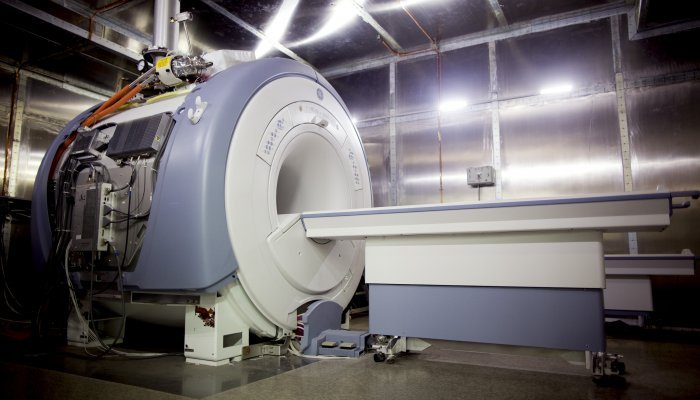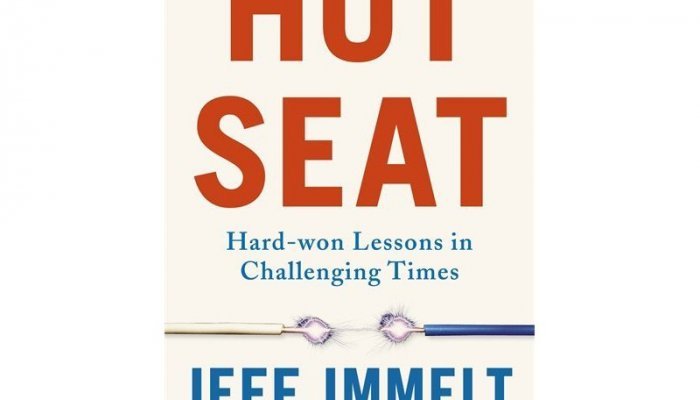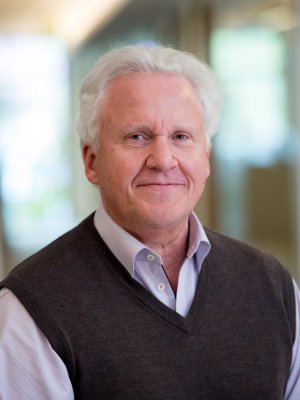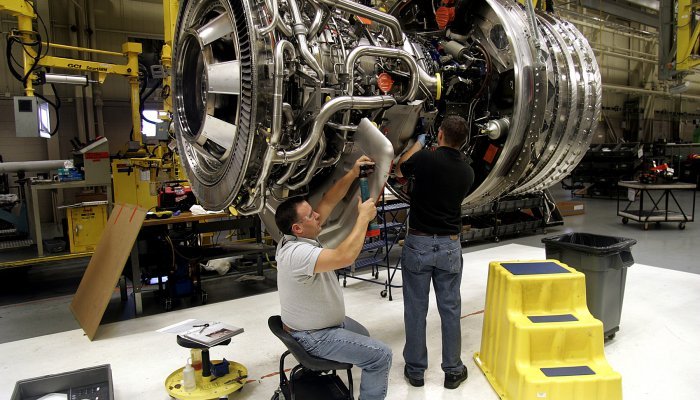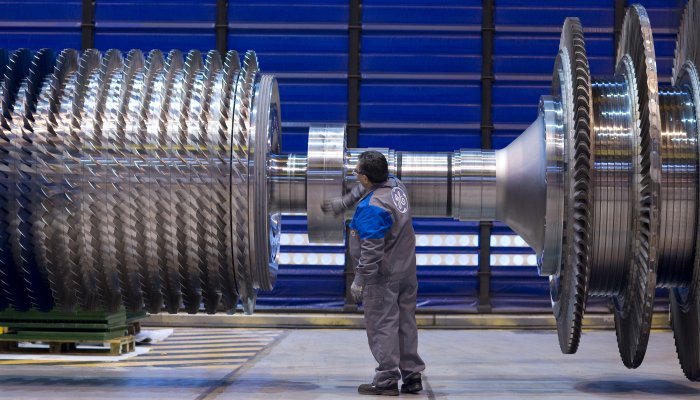It was, indeed, a glittering prize for Immelt: he was now in charge at one of the world’s biggest and most storied companies, having succeeded perhaps the most famous corporate boss of the last half-century.
“I wrote the book for two reasons: one was I felt like all the context around the company had been lost in the way it was covered. Truth equals facts plus context, and the context had just gone missing. Not that we were perfect, but we did more good than bad, and I felt, on behalf of the team, it was unfair. Second, today, all leadership is crisis leadership, and I felt like we had things to offer in the stories we told about crisis leadership,” says Immelt.
After you left, you were cast as the man who took the world’s greatest company, which had been handed to you by the world’s greatest CEO, and destroyed it. Did you?
No, but it’s complicated. In the time I was CEO, we generated $270 billion of earnings in cash; we were number one in the industries we were in; we had a good leadership team coveted by many outside of GE; and we were leading good initiatives on globalisation and digitisation. In 2017, we were Fortune magazine’s seventh most admired company. It’s true, the stock price had declined, and the leadership succession didn’t work the way I wanted it to. But we always did our best; we always did the things we felt were in the company's best interest. I am still a big shareholder, and I’m confident the company will rise again, but I wanted to tell a complete story, not just the one you asked about.
I don’t want to dwell on this for too long, but it is relevant. For example, the former editor of Business Week, John A. Byrne, says you “completely demolished the house that Jack built” and that “none of your $175 billion in acquisitions hit the jackpot”. Surely Byrne should know? After all, he and Welch wrote a book together, didn’t they?
Look, it was a different time that I led. I think Jack [Welch] was a great leader in the time he existed, in the time he led the company. But the 21st century is very different to the 20th century. We needed to improve technology; we needed to grow more globally; we needed to be closer to our customers; we needed to add diversity. But that is, again, one of the reasons why I wanted to tell a complete story. We have big businesses: healthcare, aviation, energy, gas. A lot of the acquisitions worked, and some didn’t. Again, I wanted the totality of what we did to be part of the record.
“None of your $175 billion of acquisitions worked”. Clearly Byrne hadn’t heard of a company called Amersham?
I repeat: it’s a complicated story and one that people like to cover. So, you’ve got a thousand points of view, right? I wanted to add not just my voice but the voices of dozens of people I worked with to that context. In the case of Amersham, we acquired the company for $10 billion. A third of the company was later sold for $25 billion. Wind energy, aviation supply chain – I could go down a list of things that worked.
When you first sat in the hot seat back in September of 2001, was GE actually the greatest company in the world, or was Jack Welch simply a great showman who was handing to you a parcel of very sizable problems? Or was it, as one leading British businessman at the time said – and you quote him – “a bag of shit”?
Jack was of that era. He really built a company that was 50% financial and developed it during a time when leverage was growing. Our industrial businesses were getting tired, yet we traded at the price-earnings ratio of a tech company. So, clearly, the company had to change.
We set about making that change in the time I was CEO, and it was working until the 2008 financial crisis dealt us a severe blow. And so, again, I tried to write the book in a way that I just tell the story; I don’t want to blame Jack, and I loved working for him, but everybody inside the company, and most people outside the company, knew GE had to change, knew that perception didn’t equal reality and that we needed to make improvements to the company.
Towards the very end of Hot Seat, you make what I think is a fair point, which is that luck does play a part in success or failure. Napoleon knew that. He wanted his marshals to be lucky. On your second day in the hot seat, 9/11 happened. As you’ve just said, you were also at the helm when the great financial crisis struck. Do you think of yourself as lucky or unlucky?
I try not to cast it that way; I talk about it – again – to provide context. Think about it this way: since the start of the pandemic, Zoom’s stock price has risen five-fold and airline stocks are down 70%. Airlines are very well run, right? Are they run worse than Zoom? I don’t think so. It’s just pure luck, right? Running a company as big as GE, when you have tailwinds, is challenging but possible. When you have multiple headwinds, running a big, complicated company is really quite challenging. So, when I was going through the financial crisis, I not only had to deal with regulators and improving the balance sheet and things like that, but I also had to run an aviation business, a healthcare business, and a series of other businesses. So, headwinds, volatility, and terrorist events greatly impact the way companies perform and ultimately how they’re judged. Luck matters, for sure. It’s not the only thing that matters, but it helps provide a little bit of context about how companies are doing.
But when you were hit by those strong headwinds, did they expose the conglomerate as being an archaic company formation? Is the day of the conglomerate truly over?
You need to have businesses that operate more or less in the same field. Running a conglomerate is actually very healthy when all you have to do is worry about economic cycles. But when you hit really severe events, like terrorism, running a big, complicated company becomes difficult both internally, in terms of how you’re leading a team, but also in terms of how you explain it to investors. So, the notion of having a big industrial company that’s also a big finance company, the way GE was in 2000? Those days are long gone.
GE was, and to some extent still is – although not for much longer – a curious beast. It is an industrial and technological powerhouse, aircraft engines, healthcare and much more. Yet, it’s also a kind of bank, and I’m referring, of course, to GE Capital, which finances many of the really big purchases by GE’s customers. It came to dominate GE’s balance sheet, yet you admit that GE Capital, on your watch, did get too big?
The issue was that we needed to reinvest back into the industrial company. To do that, we needed cash from GE Capital. So, what we really did is switch from industrial funding capital growth to capital funding industrial growth. In that process, GE Capital was still 50% of the company by the time Lehman Brothers went bankrupt. That made for a very challenging set of circumstances. Today, GE is purely an industrial company, but I would say being able to finance aircraft and power plants and things like that, gave us a competitive advantage around the world.
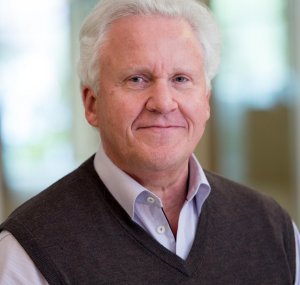
Your account of how you and the team at GE weathered the financial storms of 2008 is absolutely gripping. Both you and the company survived – just. As a part of that process, the US government declared that the company was now a SIFI – a Systemically Important Financial Institution. That was as damaging, if not more so than the crisis itself. What is a SIFI, and why was becoming one such bad news?
I didn’t blame the government for putting us in there because we were complicated, we were big, and they wanted to take certain institutions who were big and put them under enhanced regulatory review. What it created was a company that could only be in financial services, and that was very hard for us. We would have board meetings in 2010/11/12/13, where 90% of what we talked about as a board was GE Capital – regulatory reviews and so on – and then we would save the final 10% of the meeting to talk about spending a billion dollars on the next aircraft engine technology or investing in new healthcare plants in China, things like that. GE Capital just became too unbalanced, too unwieldy, to go through that scrutiny. If you’re JP Morgan or Goldman Sachs, and it’s all you do, it’s pretty simple in that regulatory structure, but not for us. The government did the right thing, but it was, in the end, untenable and unmanageable for us as a company. From a cost-of-capital or a cost-to-fund standpoint, we were just way uncompetitive with the banks. For the banks who took deposits, their costs of funds were substantially lower than ours, making competing with them very challenging.
Having made the tough decision to start unbundling GE Capital, along comes a deal for you to buy a major French power company, Alstom. You’ve been accused of personally ramming the deal through and buying dead technology?
The Alstom deal was about three things: first, services, because all power plants, before and after, had to be upgraded to meet new environmental standards, not just in the US but around the world. Second, it was about acquiring an offshore wind business, which has flourished in the last few years. Third, I felt that most of the power growth was going to be outside the United States in places like South Africa, Indonesia, and so on.
Ramming it through? We reviewed the deal 12 times at board level and more than 20 times inside the company. Everybody in the company had a chance to talk about the deal and to work on the deal. What I tried to capture in that part of the book is a sense of how transparent a company like GE really was in the context of doing a big deal like that.
Would it have helped that particular deal if the EU competition commissioner you were dealing with, Margrethe Vestager, who is, incidentally, even more powerful today than she was back then, had moved a little bit more quickly?
For sure! For almost two years, she put this massive company in limbo, so customers stopped buying, people left the company; it was difficult to make plans. It just created an atmosphere of volatility around the company, particularly in the context of the fact that the US had approved the deal in six months. For anyone who thinks regulators are coordinated globally, well, it is just not true. In this case, I think the lack of speed did actual damage.
But even if the EU had moved more quickly, the executive you had in charge of GE’s power division turned out to be a dud, at least in your view? Steve Bolze was the man, but the board wouldn’t let you fire him. Why not?
In the book, I’m tougher on myself than I am on anybody else – I just want to get that out there because everybody’s going to do the comparisons. We had a disagreement. Some members on the board thought he was going to be a good CEO candidate to succeed me, and he had done a lot of good things in his career. But, in this particular case, it’s tough to have somebody that’s threatened to resign three times actually leading a deal in this complicated market at this complicated time. And that’s really the point I made to my board.
And they overruled you?
They disagreed. They disagreed several times, and it was what it was; it turned out badly for everybody, I would say.
You’d been planning your succession for some time before the Alstom deal got under way, but then along came an activist hedge fund investor, Nelson Peltz, who appeared friendly but really wanted you out?
I can’t blame Nelson or his company, Trian Partners, for the problems of GE, nor for the problems of the market, nor for people that didn’t operate that well, but they complicated things during a transition. There’s a story for future boards and future companies: while activists may have a role and probably do have a role, they make board management and interface very complicated, and that clearly happened at GE. It made the succession harder than it needed to be, and it made the next two years for the company very complicated.
So out you did go. It was a sad note because GE runs through your blood. That cannot have been pleasant?
Oh, gosh, it was heart-breaking. On two levels, really. One was I felt terrible that I’d let the team down, and I felt horrible about that. And on the other level, my dad worked at GE; I worked at GE – it was really all I knew. I even have a GE tattoo! It was just heart-breaking, really heart-breaking. But again, I felt worse for the team than I did for myself.
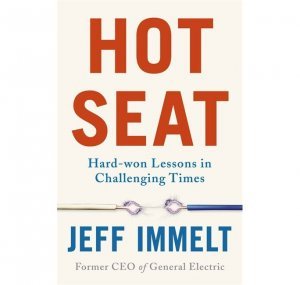
The subtitle of Hot Seat is Hard-won Lessons in Challenging Times, and you structure the 12 chapters of the book as a series of lessons, as in Leaders Invest in Growth; Leaders Compete Around the World, and the final chapter, Leaders are Optimists. After all of this, have you managed to remain optimistic?
I had to take time to heal. My wife and I moved to California, and I started working with start-ups, and I started teaching. I needed time to think and time to recapture my passion. But I kept going, and one of the messages of the book is you can keep going even when things don’t work the way you want them to. Today, I feel very satisfied with the work I do and always cheer for GE, but I have new friends, new business ideas and a new life.
As you look back, if there was one thing that you could change, what would it be?
There are so many… Let me frame the question in the notion of where we are today. After every crisis, a leader has an opportunity to completely reset their company. So, I would have gone all the way back to 2002 and really slowed down the growth of the company. I would have reset the financial/industrial mix and continued to make the industrial decisions we made, but really changed the size of GE Capital. After the crisis of 9/11, I probably could have done that and survived. That would have changed the arc of the financial crisis and much of what came later.
You also say that you would have put a stronger bench in place to choose from when it came to your successor – that’s an important leadership lesson?
Yes, and I now have the perspective of having been in Silicon Valley for three or four years. At GE, we had good leaders, but we ran big businesses, and we ran them in a big way. Big, functional organisations. If I had to do it over again, I would have had 200 P&Ls, creating many more profit and loss experiences for leaders in smaller settings to give them really good experience with strategy, flexibility, innovation. What I say in the book is, I would have run GE in a smaller way. That’s something else: legacy companies tend to do everything for efficiency instead of really driving for innovation. I would have changed that, for sure.


